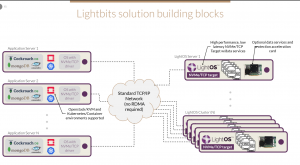This Israeli start-up is the first to use TCP instead of RDMA to provide NVMe over Fabric storage as efficient as local storage.
Founded in early 2016, Lightbits already has 70 employees at sites in Israel and the USA. The company raised $ 55 million in two rounds. Cisco, Dell and Micron are among the investors through their financial arms.
Simply meet needs
Lightbits aims to offer simple and efficient storage that evolves independently of the CPU power. Whereas traditional storage systems are losing their luster to customers. Lightbits wants to play with a head start and meet the needs for new generation applications natively developed for Cloud environments. These mainly use bare metal servers with flash disks (NVMe) and require high bandwidth, low latency and regular response times. However, they suffer from some weaknesses such as poor optimization for flash environments, long recoveries at the expense of the network, disk endurance problems and the link between physical elements and application servers. In addition, these environments are generally underused (from 15 to 25% of use) with a use of half of the possible performances. A horrible waste of resources!
A simple solution
On the source side, an agent with an NVMe driver provides data transfer to the Lightbits clusters or the Lightbits server via a standard TCP / IP network, which serves as target with the home OS, LightOS and data services. It is even possible to add new data or protection services by adding acceleration cards. The clustering of the solution ensures high availability. In the event of an incident on an SSD, online RAID protection protects the data. In the event of a server fall, clustering protects the servers from each other. If a network incident occurs, the solution is provided with a multipathing solution with an instant I / O failover. The services are themselves distributed for better protection. Replication follows 3/2/1 rules.
Completely software-based, the Lightbits solution works on x86 convenience servers as well as on standard NVMe disks. The software is ready to host QLC disks and offers all of the enterprise-class data services (compression, replication, thin provisioning, etc.). The main difference with the other solutions is to use a standard TCP / IP network to operate and to rely on standard Ethernet Network Interface Controlers (NICs) as well. In summary, the solution optimizes the use of disks, increases the endurance of NVMe disks by reasoned use and improves overall data protection operations. An interesting discovery and a business to follow in the coming months.
The operating architecture of Lightbits

Read article originally published on www.linformaticien.co

